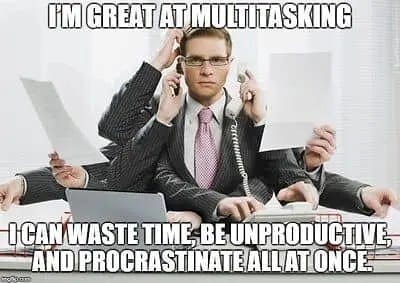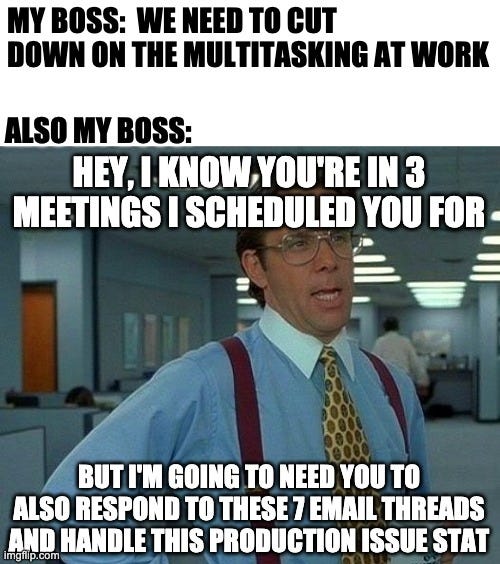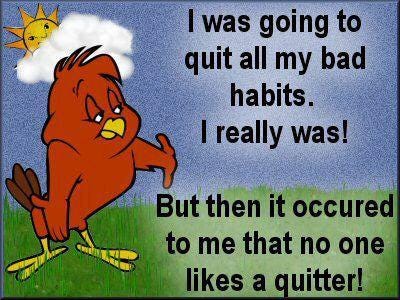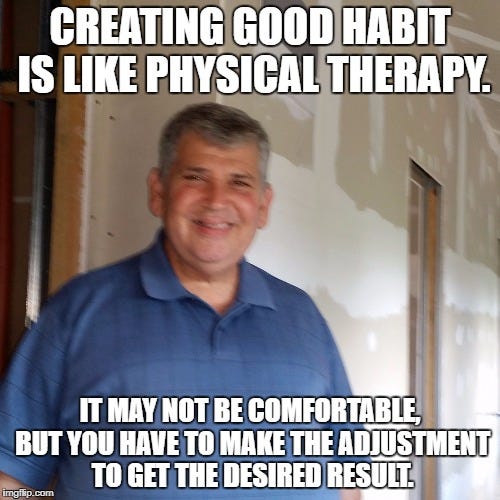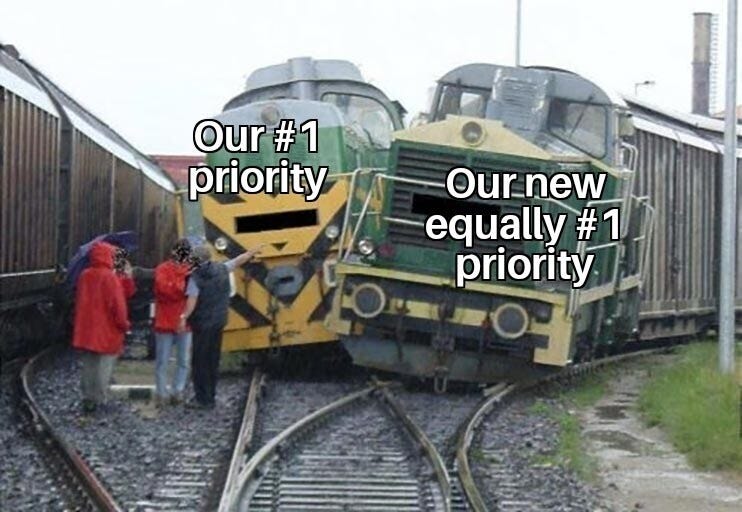Don't half ass two things
Whole ass one
Welcome, aspiring polyglot! When I was younger and well into my twenties I firmly believed that I was an expert multitasker. It wasn’t until I actually ran the numbers that I realized how much I was missing out on by splitting my focus. Yes, it is possible to do two things more or less at the same time, but the quality of the work will suffer. If you are going to try and multitask throughout the day, keep in mind the trade offs you are making.
The truth about multitasking
The plain truth of it is that humans lack the cognitive architecture to effectively perform multiple cognitive tasks simultaneously. According to this Stanford study, people who tried to multitask heavily suffered, “worse performance across all tasks, showing greater distractibility, poorer memory control, and difficulty filtering irrelevant information.” That seems reason enough to me to avoid even attempting to multitask.
It makes sense, though. Every time you believe you are multitasking, what you are likely doing is rapidly task switching. Whenever you make a switch, you give your brain the opportunity to be distracted again. Whereas staying focused on a single task removes this risk almost entirely. Yes, there will still be distractions, but you are less likely to see them if you stay enveloped in the task at hand.
Aside from causing these tasks to take longer to complete, believe it or not, it also affects the quality of the finished project. Divided attention is something most people have direct experience with, yet seemingly believe that they will be exempt from the effect. For example, we all know that when someone has their phone out during a conversation, they aren’t actually hearing most of what is being said. Even less of what is being communicated. It is no different working on your own.
Breaking the habit
With more and more technology entering the fold, the desire to multitask continues to grow. So, too, does people’s belief that it is possible. This can often be enough to convince people that trying to break the habit is not worth the effort. Until you start to see the raw numbers and the change in quality of the finished project, you will want to make the change immediately.
In order for that to happen, though, you have to test yourself. Not a one time test, either. You have to measure the time, the feeling, and the finished project over the course of a month, not a week. Timing your activities is by far the most important, though. Many of the things you assume will take you hours will end up only taking one hour. Before you do anything though, you have to take a baseline.
Find 3-5 things you do daily or weekly and start timing them. Do not change any of your behavior or your habits. Do everything as is, just with a timer. In theory, you won’t have single sections for this since you will be attempting to multitask. This task switching will make things difficult to measure, but try to get a general time for two or three things that you accomplish over a given amount of time.
After you establish your baseline, work on trying to remove the task switching altogether. Here you will have single columns for each task since, in theory, you will be putting your sole focus into each activity. Obviously, for me, this is about learning a new language, so time your study sessions. However, this is one of those things that will be beneficial across domains when done correctly.
The behavior patterns you have built over years or decades are not going to die a quiet death. You are going to have to fight against them. Without the evidence that you are leaving potential on the table, it will be all too easy to fall back into your old ways. That is why it is crucial to not just measure the timing but the quality as well. Once you realize how much more you are capable of, it is addicting and that in and of itself makes it difficult to regress.
Prioritization
Determining the order of importance for things within your life is something that has to be thought about and reviewed from time to time. No matter how pure your intentions and the goals you have, if you aren’t constantly keeping yourself in check and reviewing your progress you will lose track of your goals. It gets especially difficult as time goes on so revisiting often is crucial.
That said, do not forget that, in theory, you should be accomplishing your goals. Meaning your priorities will necessarily change over time. Yes, you should stick to your guns when you are in the middle of the climb, but over time you will have to adjust to ensure you are always heading towards the correct target. Here is how I set up my priorities list:
What needs to be done?
Things that actually move the needle now
Things that will pay dividends down the line
Tedious tasks that need to get done
What would be nice to accomplish?
Anything that is not urgent goes here
If you can delegate, you should be delegating these first
What can you fill your time with?
Anything else goes here.
Secondary prioritization with regards to delegation should be thought of here as well in this same order
Iteration and adjustment will help you dial in your ideal splits. For that reason, I would recommend trying a few different approaches and tracking their efficacy within your life. What work for me may not work for you. But you won’t know until you have tried different things. Finding and mastering the things that work for you is the biggest challenge and when you do that everything else will slowly fall into place.
Conclusion
The biggest trap people, myself included, fall into with regards to focusing like this is that it works so well they stop doing it. When things are going well, it is easy to take the good habits you spend time building for granted. Unfortunately, it takes 21 days to build a good habit and only a fraction of that time to break it. Waiting longer to start building only means more time spinning your wheels without the desired progress.
Learning how to get away from half-assing things that are important to you takes time. Especially when you believe that everything you have been doing while multitasking has been the best you can possibly do. It will be difficult to master prioritization and single task focus, but you can do difficult things and be great. So get out and do some difficult things and become great. I am rooting for you.
Requests
If you have anything you would like covered you can reach out to me on X, Instagram, or at odin@secondlanguagestrategies.com.
Additional Resources
Don't want to spend time playing catch up? Pick up the 3 Months to Conversational book now available on Amazon! 3 Months to Conversational
For more long form content be sure to check out the website and the FREE Language Learning PDFs we have available!
Subscribe for new content on YouTube and TikTok!
Learning Spanish? We have begun aggregating resources in you Spanish Resource Newsletter!
Don't forget to pick up your very own French Language Logbook or Spanish Language Logbook


